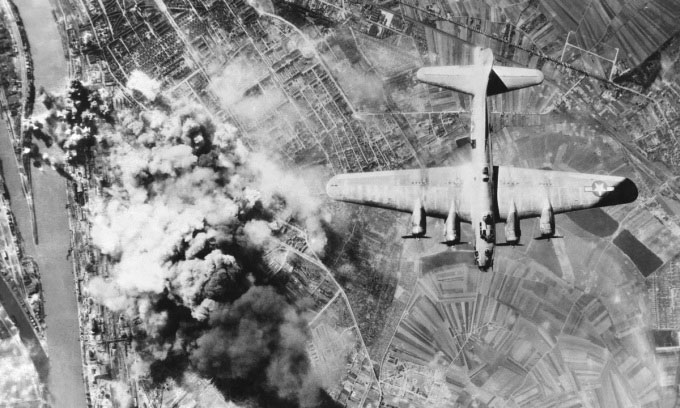Bombs left over from the World War are increasingly explosive
Bombs containing the compound Amatol from decades ago are becoming more dangerous because the substance is increasingly sensitive to impacts.
The Earth has millions of tons of landmines, especially from the two world wars that took place in the 20th century. While a large amount has remained buried and forgotten for decades, new research by the research group Science from the University of Oslo and the University of Stavanger (Norway) shows that many bombs contain a chemical that makes them increasingly likely to explode over time, IFL Science reported on March 27. New research published in the journal Royal Society Open Science.

An American Boeing B-17 Flying Fortress dropped bombs on the Ludwigshafen synthetic oil and chemical plant in Germany during World War II. (Photo: Everett Collection)
This chemical is Amatol, a highly explosive material made from a mixture of TNT and ammonium nitrate, used in many types of ordnance created for World War I and World War II, including aviation bombs, artillery shells, sunken bombs, mines.
Other common explosives, such as pure trinitrotoluene (TNT) or Pentaerythritol tetranitrate (PETN), remain relatively stable over time and do not become more dangerous than they were initially. However, over time, Amatol appears to become more sensitive to the effects if stored under certain conditions.
In a new series of experiments, the Norwegian research team dropped heavy objects on five Amatol explosive samples collected from the battlefield. The results show that the bombs are more sensitive to impact than before and are becoming increasingly unstable. This change in properties is likely due to the way Amatol reacts with other chemicals in the natural environment.
"Research reveals that the presence of moisture, among other factors, may contribute to increased sensitivity to the effects of Amatol . Explosive mixtures containing ammonium nitrate may become sensitized when exposed to contaminated with small amounts of metals, or when exposed to metals. These contaminating metals can react chemically with ammonium nitrate, forming complex salts and causing the mixture to become sensitized," the team said. help explain.
The discovery of unexploded bombs from World War II is not uncommon. Last month, a 500kg German bomb was found in the backyard of a house in Plymouth, England. More than 100 soldiers and bomb experts responded, while 10,000 nearby residents had to evacuate. Luckily, the bomb was safely disposed of without any casualties. However, in 2008, 17 people at a construction site in the town of Hattingen, Germany, were injured when an excavator ran over a 250kg World War 2 bomb, causing it to explode.
New research shows that incidents involving unexploded bombs may become increasingly serious. The research team also emphasized that those in charge of disposing of unexploded bombs need to be informed about the increase in sensitivity of Amatol over time.
- What will happen if all the nuclear bombs in the world fire at the same time?
- What is a thermo-weapon?
- See the types of war weapons
- Misconceptions about bombs and mines that we still think are true
- To destroy the world, only 10 fusion bombs are needed
- The implanted grasshopper device has the ability to detect bombs
- Robot bombs
- Japan used to build bombs flying across the ocean
- Super nuclear bomb has the most explosive power in the world
- Detector for explosive materials under the sea
- New uses of wifi: Detect bombs and explosive materials accurately!
- Israel develops explosive devices using nanotechnology
 'Fine laughs' - Scary and painful torture in ancient times
'Fine laughs' - Scary and painful torture in ancient times The sequence of numbers 142857 of the Egyptian pyramids is known as the strangest number in the world - Why?
The sequence of numbers 142857 of the Egyptian pyramids is known as the strangest number in the world - Why? History of the iron
History of the iron What is alum?
What is alum?